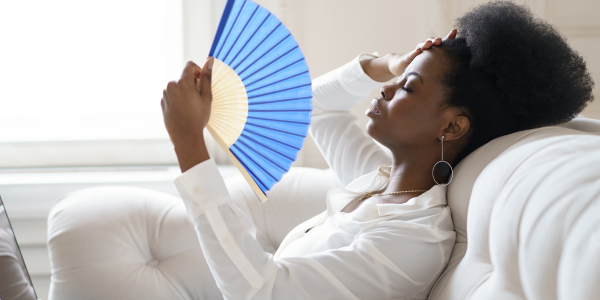
You’re in the middle of a meeting, and suddenly you feel hot. Your heart races, and you start to sweat. Then, the sensation subsides as quickly as it came on.
Has this happened to you? If so, it might be a hot flash!
About 75% of women experience hot flashes during menopause and perimenopause, which can begin in a woman’s 40s, but may start as early as her 30s. While you may not be able to avoid hot flashes altogether — unless you’re already on a customized bioidentical hormone replacement therapy (BHRT) — there are ways to manage hot flashes and be prepared when they strike next.
Before we explore what to do about hot flashes, let’s take a closer look at what they are and why they occur.
What Are Hot Flashes and Why Do They Happen?
Hot flashes can come on suddenly and cause you to feel uncomfortably warm and sweaty. They’re often accompanied by a rapid heartbeat, flushing, and perspiration. They typically only last from 60 seconds to several minutes, but can feel like an eternity when you’re in the middle of one!
You may experience hot flashes multiple times a day or only occasionally. Women commonly experience hot flashes during menopause when estrogen levels start to decline.
How to Manage Hot Flashes
To better control hot flashes, be aware of what could bring them on. Some known hot flash triggers include:
- Spicy foods
- Hot beverages
- Smoking
- Alcohol
- Caffeine
- Stress
- Hot weather
If hot flashes are interfering with your quality of life, there are several ways to manage them. Try these tips:
- Wear layers you can easily remove. This will help you regulate your body temperature when a hot flash strikes. Wearing loose cotton-weave clothing will allow air to circulate over your skin.
- Stop smoking. Women who smoke or use tobacco products tend to experience more hot flashes.
- Limit alcohol. Drinking alcohol can trigger hot flashes for some women. Based on personal experience, you may have to determine whether you need to avoid alcohol altogether or drink in moderation.
- Maintain a healthy weight. Regular exercise and conscious eating habits promote a healthy weight, which may decrease the frequency and severity of hot flashes.
- Remain in cool temperatures or air-conditioned areas if possible. Keeping cool can help prevent hot flashes from occurring.
- Carry a portable fan. This tool can help you cool down when a hot flash strikes.
- Watch what you eat. Spicy foods and caffeinated beverages can trigger hot flashes, so it’s best to avoid them.
- Reduce stress. Stress can trigger hot flashes and may also make them worse. Prioritize some relaxing habits to help manage your stress.
- Meditate. Some research shows that deep breathing and meditation may help reduce the severity of hot flashes in perimenopausal and menopausal women.
- Consider bioidentical hormone replacement therapy (BHRT). This type of therapy may optimize your body’s hormone levels, addressing the imbalances at the root of your hot flashes and other menopausal symptoms. BHRT uses bioidentical hormones to supplement your body’s natural supply when you’re not producing enough. Compounding pharmacies, like Belmar Pharmacy, that specialize in Couture Medicine™, can prepare customized medications to meet your body’s unique needs. Talk to your doctor to see if BHRT is right for you.
Hot flashes are common during menopause, but that doesn’t mean you have to suffer. By following these tips, you may be able to reduce the frequency and severity of hot flashes, so you can get back to enjoying life with fewer interruptions.
